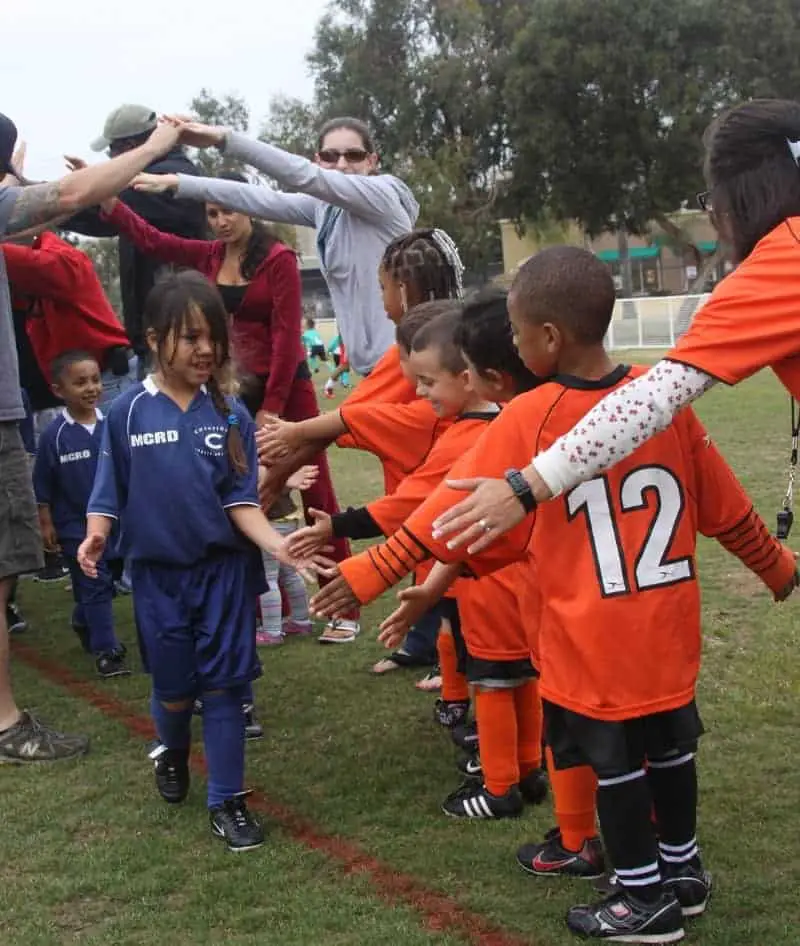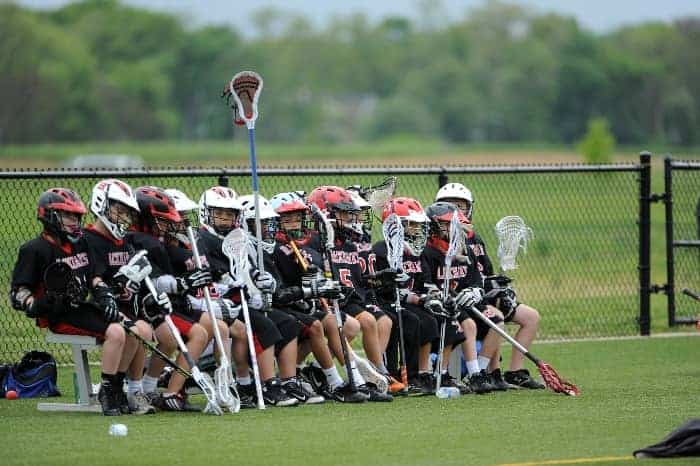So, I’m assuming you’re reading this because you’re either just about to sign up as the next youth sports coach or you already have a team and you’re having a few… challenges? Keep reading to find out the real and potential challenges of coaching youth sports and how to stay sane, motivated and rational despite your endless list of responsibilities.

Working positively with passionate parents, mentoring kids to become good people, keeping children having fun and loving the game, working constructively and honestly with the club and association management are some of the challenges youth sports coaches will face.
Youth sports coaching is a multifaceted, challenging role that can warm your heart after a kid slaps you a high five or be such a stressful experience you want to quit. And we don’t want that! This post explores 6 challenges of coaching youth sports. Some obvious and some not so. We also dive into solutions to overcome these challenges to help you stay in the game longer, because youth sport doesn’t exist without you.
1. Working Positively with Excitable Parents
Forming a productive, respectful relationship with each and every parent on the team will likely be your biggest obstacle as a youth sports coach.
Some will buy into the positive, equal opportunity environment you are hopefully trying to create and some won’t.
Some will bark orders and yell from the sidelines, while making the car ride home after each and every game a miserable experience.
While others on the flipside will simply smile and say after a game to their child, “I just loved watching you play today,” reminding you why you started coaching in the first place.
Your challenge is to create an environment where you encourage parents to act lie like the later.
Be the greatest fan for their child and let you do your job as coach.
But how do you logistically create a space that allows this relationship to develop? Here is a few ways:
If you hear a parent yelling negative comments from the sideline, confront them when the time is right.
Timing is everything.
Confronting a parent about their behavior at practice or during an organized meeting, not after the game is ideal. Emotions are low and they are likely to take on board what you’re saying without becoming defensive.
Refrain from raising your voice and explain why this behavior has no place in youth sports. Often the parents don’t understand the negative impact they are having until it’s highlighted.
Not all parents will respond well to this but it’s your responsibility as the coach to provide a fun, motivational environment for your kids.
Related post: What are the Responsibilities of a Youth Sports Coach?
Set early expectations for youth sports parents
As the coach, call a meeting with all parents and players and set expectations at the start of the season about how the next few months will look.
When training is, what tournaments are planned and expectations of playing time (this should be even by the way) and parent involvement.
Be clear about the importance of youth sports being fun and what your coaching philosophy is.
Don’t be afraid to be honest and use real-life examples of behaviors not tolerated. As an example, if you bench kids for bad behavior and poor sportsmanship, make this clear.
Related post you’ll want to read: Obnoxious Youth Sports Parents: Your Role As Coach
Embrace feedback from parents
Don’t be scared of feedback from a parent but encourage this feedback to happen on a one-on-one basis.
When a group of parents confronts you all at once this often leads to a gang mentality where not a lot gets done outside blaming and pointing fingers.
This type of intimidation and control is exactly what we are trying to remove from youth sports so don’t fall victim to this. Take control of how and when you listen to feedback from parents but don’t avoid it altogether because you’re scared.
They are parents and you are the coach. Take control but don’t go on a power trip.
Encourage parents to be involved in volunteer roles
To help express parent’s passion and commitment to their child’s sport, consider giving them a role to help out around the club.
This could be anything from administration roles, bringing healthy snacks, working in the canteen or taking tickets on game day. Some organized and diligent parents may also be perfect team managers or “team mom’s” too but I know we are trying to move away from this terminology.
Just because a parent has a big personality, don’t shy away from encouraging them to be involved. It can help them realize the other aspects of youth sports and why they are so important.

Support parents to allow their kids to play multiple sports, but not at the same time
I’m a huge advocate for kids playing multiple sports and not specializing too early.
BUT if you see a kid leaving your practice or game to go to another practice for a few more hours, it’s time you stepped in and speak to their parents. Again when the time is appropriate.
Kids playing multiple sports are fine, but needs to be managed if during the same season. Otherwise, this can lead to burnout and overuse injuries requiring surgery, potentially crippling them for life.
The British Journal or Sports Medicine states,
“Such an excessive focus on early intensive training and competition at young ages rather than skill development can lead to overuse injury and burnout”.
Allow kids to take adequate breaks in and between seasons. Their bodies are not ready for repetitive, constant stress, even if you (or they) think they’re are up to it.
Check out this compelling TED Talk from Dr. Bergeson who interestingly talks about “playing the sport of the season” and “unstructured play.”
Encourage parents to not remove all obstacles for their kids
You may have heard of a lawnmower parent or helicopter parent? These parents are renowned for “mowing down” all the obstacles their child faces.
While most think they are advocating for their child, they are actually doing the complete opposite, ruining the chances of their child developing resilience.
As a coach do your bit. Make the child carry their sports bag, force them to be responsible for bringing their own uniform. Make them put their drink bottle down on the bench and make sure they have their own equipment ready for the game. Don’t do everything for them and encourage patents to play along.
If their child faces adversity on the sports field, mentor their parents on how to deal with the problems rather then just making them disappear.
It may seem harsh but the beauty of youth sports is we have the power and influence to set up kids for the reality of the real world.
As a coach, don’t create “elite” teams for kids
I once heard about a youth sports coach creating an “elite” basketball team for his 6-year-olds. He benched kids for not performing and even made cuts mid-way through the season.
These teams at such an early age lead to “bragging” from parents causing the “elite kids parents” to segregate from the “not so elite parents.”
I know you’re passionate and want the kids to be the very best they can be AND maybe even go to college… but we need to remember we are coaching kids and it needs to be fun. Otherwise, they will simply quit.

2. Keeping the Children Engaged
Your job as a youth sports coach is to keep your kids engaged, having fun and enjoying sports. But did you know 70% of children are dropping out of organized sports by the age of 13. (source)
I hate this statistic.
But why does this keep happening?
Some say it’s because when high school starts there are competing commitments and interests, while others say it’s the kids who become disinterested due to lack of talent and missing out on “elite” teams.
While this is partly true due to a lack of “social organized sports” available during the teenage years within the United States, we cannot give up and accept defeat.
So how do we keep our kids engaged and wanting to play sport longer?
- Constantly remind yourself why kids are choosing to play sport. They want to have fun and play with their friends. So, create a practice and playing environment which does exactly that.
Related post: Is Youth Sports Too Intense? A Message For Our Coaches
- Prepare a practice plan with a range of different, stimulating drills and activities. Don’t have the same training plan every week even though a particular skill still needs work.
- Conduct drills with minimal sitting or standing out.
- Ask the kids feedback on what they like doing and how practice can be made more fun.
- Understand that all kids have “bad days” just as we adults do. They could have a bad day at school, feel sick or some other reason. Don’t be so hard on the kids on days like this, especially in the younger ages.
“If kids are having fun, you’re probablly doing a great job.”
(source)

3. Mentoring Driven Kids
We often hear parents saying, “it’s the child who wants to play and train this much, it’s not me pushing them!”
But how do you think they developed this train at all cost mentality in the first place? Is it the parent or was it something a previous youth sports coach said to fire them up?
While it’s true that some kids are more driven and high achieving then others, they are still kids. Moldable and influential by you as the coach, their parents and even professional athletes on TV saying “practice makes perfect.”
We are the adults, both as parents and coaches, responsible for creating balance in these kids lives.
Kicking the ball in the park with their friends without referees and uniforms, jumping on the trampoline and messing about in the pool is what kids are supposed to do. They are not wired to train like Olympic athletes 24/7, despite how much they tell you they want to be the next Usain Bolt.
Coach in a way that inspires kids to be the best they can be whilst importantly realizing life exists outside the sports field.
Adequate rest is important. So think twice before extending the tournament schedules and distances traveled for games and practices…
4. Teaching Kids Sport Is More Than What’s on the Scoreboard
When kids watch their favorite athletes on TV what do they see?
Attitude and a win at all cost mentality, right?
So what do these kids bring to practice and games? Attitude and the need to win above all else, even at the detriment of teammates, parents and the coach.
So should we stop kids from watching professional sportspeople on TV? I doubt this would fix the problem.
But it does give us a great opportunity as coaches to instill behaviors and beliefs at a youth sports level that teaches them why sports are so much more than what’s inside the box.
But how? Here’s a few ideas:
- Reward players for playing hard. Yes, this mean rewarding kids who do well on defense even in practice.
- Make your players shake hands after a game
- Say thank you to their parents for coming to watch
- Be respectful to the umpires
- Encourage their teammates even when the chips are down
- Cheer loudly on the bench
- Trying again even after you missed a shot, fell over, got beaten etc.
Every youth sports coach will have their own philosophy on how to be an exceptional role model and not simply a winning coach.
Over time you will develop your own style, but for now, observe your favorite coach or read about why they were great and coach in a way which feels right and importantly in the best interest of the kid – not the scoreboard.
Winning doesn’t make a great coach.

5. Balancing Coaching vs Everyday Life
This challenge of youth sports coaching gets swept under the carpet. Either the coach themselves doesn’t realize it’s impacting their home life or their family doesn’t want to say anything because they, the coach, “love it.”
As both a previous youth sports coach and the wife of an active youth sports coach, I know it can be a tricky balance but you have to be honest with each other.
I know the lines can blur particularly when you are coaching your own child and why we wrote the post titled When to Stop Coaching Your Child? 4 Signs You Must Know. But in order to keep your family life afloat, it’s a must.
Here are a few proactive ways to maintain a balance:
- Maintain a “date night” with your spouse/partner. Just because the games normally occur on a Friday and Saturday night, doesn’t stop you from getting a babysitter and going out on a Tuesday?
- Make plans with your family outside the sports arena. Take them to the zoo, go on bike ride, explore the new trampoline center or have a picnic at the beach. Ask your family what they want to do and leave a space free in the diary.
- Allocate time to “cut tape” and create practice plans but don’t let it take over your entire night. Cook dinner with your spouse, or watch them cook, hearing about their day. Spend time just listening.
- If you do coach one of your children, what about your other kids? (if you have others). Spend time with them. Go to their games, listen to them sing or play an instrument and attend their school production. Be interested in what they are working on without interruptions for practice or a game.

6. Being on the Same Page as the Youth Sports Organization You’re Coaching For
Lately, I have been hearing issues occurring between the youth sports coaches, the organization and also the parents.
A lot of the issues stem from money, which I’m sure is no surprise when discussing the enormous business youth sports has become today.
“Youth sports in the U.S. tops professional sports leagues like the NFL with more than a $17 billion market value”,
according to WinterGreen Research, a market research firm that tracks the industry
“On average, families spend nearly $700 a year on each child’s athletic participation” and that’s typically for one sport. (source)
This price can skyrocket if kids play multiple sports or pick the really expensive ones like lacrosse, hockey and baseball.
But the issue at a club level is not only the cost for parents in registration fees, it’s also the greed seen in some sports clubs to accept more kids into their program than will ever see the field/court.
Accepting 15-20 kids to play in a youth basketball team for example, when only 5 take the court at a time, is like the size of an NBA roster. Do we really need to overcommit ourselves like this in youth sports just so we can charge parents the fee of signing their child up?
But the financial harm doesn’t stop there. We then talk about travel, uniform and equipment costs, some would argue this is just the tip of the iceberg.
So one of the challenges youth sports coaches may face is to either agree or overrule these greedy clubs and associations.
Do you toe the line and tell parents what they want to hear?
Do you put your foot down when it comes to accepting so many kids into the program?
If the club or association like you, they may offer you money, extend your contract and try to sweeten the deal in order for you to support their view.
If you become caught up in the mess as a youth coach, sit back and ask yourself, what kind of role model am I becoming?
Here are a few solutions to this hidden challenging issue facing youth sports coaches:
- ALWAYS remember why you started coaching kids in the first place. If you’re in it for the “money”, we suggest you go find another job.
- Steal my motto…if I pick them I play them
- Escalate the need for a proper ongoing parent and coach education program (if in a school environment).
- Seek advice from your spouse or the most honest best friend you have. If they notice a “change” in you and its’ not for the better, you might want to pay attention to what they are saying.
- Don’t allow youth sports to become an investment in a future scholarship. Let kids be kids. If they are good enough to make it, it will happen naturally.

Summary: Challenges of Coaching Youth Sports
From managing parents, guiding motivated kids to being aware of club or association intentions, these are just some of the challenges of coaching youth sports today.
I hope this post opened your eyes to what challenges may lie ahead and how to attack them if you are ever confronted.
Was there any other major challenges I forget to mention? Let us know in the comments below.
Cheers,
Emma
